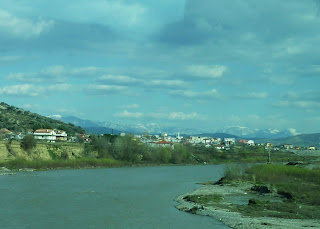
In 1991, when the communist government in Albania was official removed from power, Pogradec had a population of about 20,000 people. To my understanding, it had maintained that size for much of the 20th century-- not a major city, but a noteworthy population center. If you can find pictures of Pogradec from 50 or more years ago, you'll see a tidy collection of stately old homes and businesses that are surrounded by the lake, mountains, and the broad plains that extends for some distance to the south and east. Sometime, probably between the 1960's and 1980's, the communist government replaced many of the city's original structures with block apartments, but the overall footprint of the city did not grow significantly.
The last twenty years, on the other hand, have ushered in sweeping changes in the city. Albania, in general, has seen its cities grow by leaps and bounds during post-communism years as villagers moved into the urban centers in search of employment and a better taste of the modern world. Pogradec's story is nowhere near as dramatic as, say, Tirana's (the capital's estimated population growth in the last twenty years falls in the range of 500,000-1,000,000 depending on who you ask), but significant, regardless. The official population now stands at just under 40,000 and the city's footprint, which had stayed so steady for so long, has been growing at a dizzying pace.
I say dizzying not only because of the sheer number of buildings that appear with each passing year, but also because the rate of growth seems disproportionate to the actual demand that exists here. The population has doubled in the last 20 years, but the growth seems to be leveling off today. The city's economy depends on the summer tourism market. Outside of that, there is little in the way of industrial, business, or cultural development that would indicate that the city will continue to double its population with each passing generation.
The new apartment buildings continue to rise high, however. The situation in Albania, as best as I can tell, goes about like this: most people have little money. A few people have lots and lots and lots of money. This upper crust seems to have two favorite kinds of toys that they purchase repeatedly with their fortunes- new Mercedes and big apartment buildings. Should any of you big wigs happen to be reading this, I would like to take the time to remind you that Pogradec, lovely though it is, still lacks a few things. For example:
-A real movie theater
-Mexican food
-Putt-putt golf
-Chinese food
-A bowling alley
-Greek food (seriously, we're 20 miles away from the border)
-A functioning playground
-Milkshakes
-A scoreboard at the football stadium
-Sub sandwiches/ any kind of street food that isn't byrek or sufllaqe
-Paved streets other than the main roads
-A cheese shop (A room with 30 wheels of djathe i bardhe doesn't count. You would love cheddar, I promise)
-A readily available map of the city
-Indian food
-Marked hiking trails
-Margaritas
-A hostel
Just to name a few. (I promise that I'm quite well fed over here. I just miss variety, is all) I understand that some or most of those would be massive failures here, but surely you could find a successful business venture-- or at least a nice philanthropic donation-- buried somewhere in there.
Buried it shall remain, however, because there seems to be no end in sight to the construction of new apartments. Whatever these investors may lack in creativity or planning, they make up for with gusto. I suppose that there is something to be said for that. If you're going to roll the dice in life, there is no sense in doing it quietly. You load your car up with fireworks and cruise the city in search of a hairpin turn with a gas station on the outside corner. If you can take it at 60 mph, people will be talking about you for a long time. If you can't, at least you get to go out with the happy knowledge that they'll be talking about you for even longer.
So there we stand. On the one hand, fame awaits in the form of a growing city with prime real-estate on a beautiful mountain lake. On the other hand, a saturated housing market and questions about the long term population growth makes the cool embrace of infamy just as likely. The money of Pogradec stared down the road, stroked its chin, opened a couple more buttons on its shirt, and punched the gas. If you're looking for a good spot to watch the coming spectacle, look no further than the lakeside boulevard. In a 1/2 mile stretch of that road that apparently used to be fronted by small private houses and open fields, you can now find this:








8 brand new, huge apartment buildings being built quite literally next door to each other at the exact same time. Some may question the sense in that. Then again, a true gambler knows that there is only one opinion that really matters.
Yes indeed. The Hoff approves. Vazhdo, you daring gents. Vazhdo.



































